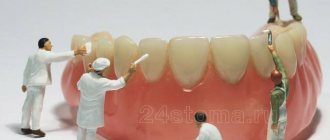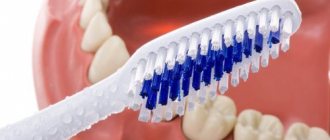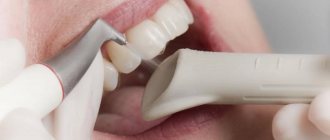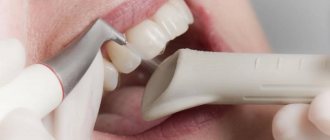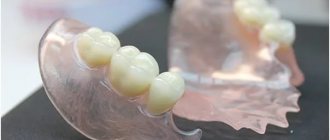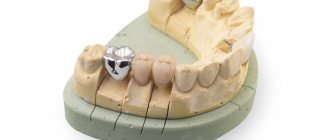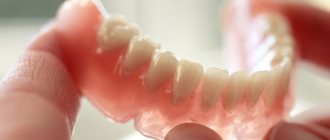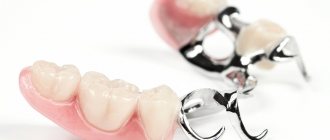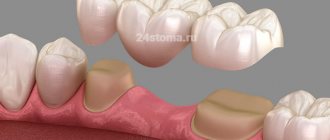Several decades ago, removable dentures were called “teeth in a glass” because they had to be removed from the mouth at night and placed in a container of water. This was due to the need to maintain in good condition the manufacturing material that was used at that time to create such structures. Let's talk about whether anything has changed since then and whether it is necessary to take off dentures at night now.
How long does it take to get used to removable dentures?
On average, 30 days. At the beginning of use, removable dentures feel like a foreign body and can cause discomfort. They can interfere with the production of sounds (diction), cause increased salivation, changes in taste and temperature sensations, and difficulty biting and chewing food. Sometimes, when applying removable dentures, the urge to vomit may occur. It is also possible that the dentures do not adhere satisfactorily, or food debris gets underneath them, or biting the cheeks, lips, or tongue. All these phenomena decrease by the end of the first week of wearing the prosthesis and disappear after 3-4 weeks. After an adaptation period, the patient already feels more comfortable with prostheses than without them.
The main condition for quickly getting used to prostheses is their constant use. The rules and recommendations below will help you shorten the adaptation period.
The main factors for the longevity of dentures
The service life of a prosthetic structure greatly depends on the quality of its material.
One of the factors influencing the service life of a denture is the professionalism, qualifications and experience of the prosthetist. This should always be taken into account when choosing a dental clinic and doctor.
To timely eliminate problems with the prosthesis, it is necessary to regularly visit the orthopedist who installed it.
Even after installing the prosthesis, the orthopedist will monitor its condition and eliminate possible problems in a timely manner, but for this you need to visit him regularly.
The condition of the denture and its durability depend on how its owner treats it. Moreover, it affects not only how he follows medical recommendations for care and use, but also the possible development of certain diseases. But careless care can reduce the life of a denture by almost half.
How to quickly get used to new dentures
- Immediately after submitting the finished work in the dentist’s chair, learn how to remove and put on removable dentures yourself. At home, practice again, first in front of a mirror, then without it.
- Before applying, soak removable dentures in water or use a fixative.
- For the first one and a half to two weeks after the application of dentures, they should not be removed from the mouth, even at night. Take them out only for cleaning and oral hygiene.
- To reduce the gag reflex, try sucking the candy by placing it towards the roof of your mouth and holding it in this position with your tongue.
- Rinse your mouth often with warm water (8-10 times a day) or drink hot tea.
- Reading aloud in a calm, relaxed atmosphere for 2 hours helps to quickly restore correct pronunciation. In most patients, diction is restored quite quickly (after 5-6 days)
- For the first 2-4 days of wearing the prosthesis, try to eat soft foods and not load the prosthesis until you fully adapt to it. Try not to bite with your front teeth. Chew your food slowly and thoroughly.
- Chew food with your side teeth at the same time (left and right at once). Cut food into small pieces. Introduce more fruits and vegetables into your diet (this will allow you to switch to your usual diet earlier).
Recovery after removable dentures: lifestyle and rules for caring for new teeth
Caring for removable dentures is very simple and does not take much time. The structures are easily removed from the mouth, which allows you to clean them both in the morning and evening, and after each meal. If you have conditionally removable dentures, their daily removal is not required. However, more thorough cleaning, including the internal surface, must be carried out every 3-4 weeks.
How to quickly get used to removable dentures
Naturally, each person is individual, and the duration of adaptation directly depends on the model and materials of construction. Conventionally, the process of addiction can be divided into three stages:
- irritation stage, which lasts about 7-10 days,
- stage of conditioned inhibition (duration – 3 weeks),
- the stage of full adaptation, when the patient completely gets used to the new artificial teeth (occurs after 30-40 days).
Immediately after installation, removable dentures may cause you nausea, increased salivation, changes or complete loss of taste, and difficulty eating. Diction problems also occur. But as you get used to the design, all manifestations disappear completely or are reduced to a minimum.
During the period of getting used to the prosthesis, you need to wear it constantly, without removing it while eating and sleeping. You should not use it in case of acute pain - it is better to consult a doctor to correct the design.
It is important to understand that any removable denture, especially if it is installed for the first time, will require regular correction. The gums sag along with the bone tissue, the position of the joint changes, the bite is corrected - all this
will cause the prosthesis to feel uncomfortable. One visit to the doctor and the position of the device will change - you will become more comfortable. Remember this and do not ignore your doctor's recommendations.
How to restore diction
To restore diction, it is recommended to speak as much as possible: read books, pronounce tongue twisters, while holding one or more sweets in your mouth (without sugar! 15-20 minutes, several times a day. Course duration - the first 1.5-2 weeks after prosthetics.
What hygiene products can be used
What to do if the prosthesis rubs and does not fit well
- use ointments (Solcoseryl, Metrogyl Denta) or sea buckthorn oil. Apply the oil to the gums for a maximum of 20 minutes after eating and cleaning the denture 3-4 times a day,
- It is forbidden to sharpen dentures yourself, after which you can simply throw it away,
- If there is acute and constant pain caused by rubbing of the structure, you should consult a doctor for correction. 2-3 hours before the visit, the denture should be in the mouth so that the reason why the structure is rubbing becomes visible.
If the device is not fastened well, then you should contact your attending physician - an orthopedic dentist. If the correction does not help, you will have to use special fixation creams: Protefix, Corega, Lacalut Dent. Choose the one that suits you - according to taste, consistency, fixation time. Try different options and choose the best one.
How to eat after installing structures
If the prosthesis is made of comfortable materials, if it suits you, then you will be able to eat well right away. Restrictions occur when little time has passed after the removal of living teeth, when you initially had gum inflammation. In such situations, pressure causes pain; you need to limit the chewing load to avoid discomfort and allow the gums to recover.
In general, during adaptation it is advisable to adhere to the following recommendations:
- give preference to soft and warm foods, exclude viscous foods,
- you need to chew carefully and thoroughly, cut food into small pieces,
- It is better to chew food on the side where the process does not cause pain,
- You should refrain from biting food with your front teeth.
After adaptation, when the prosthesis no longer causes pain, you can return to your usual diet. But you should exclude foods that are too hard, viscous, sticky, excessively hot and cold (drinks and soups should be warm, ice cream should be kept a little at room temperature).
How to clean dentures and remaining teeth
You need to brush your teeth exactly as you are used to: in the morning, in the evening and after every meal. But as for prosthetics, the recommendations will be as follows:
Daily care
- clean the structure in the morning and evening with a soft toothbrush using toothpaste without abrasives or regular soap (preferably baby soap). Pay special attention to the internal area that is in contact with the gum,
- Soak the denture daily in a solution of citric acid (1 teaspoon per 150 ml of warm water): soak it for 10 minutes to disinfect and loosen plaque. Carry out the procedure before brushing your teeth 2 times a day. Afterwards, rinse thoroughly with water. Change the solution every 3-5 days,
- after each meal, the structure is removed and thoroughly rinsed under running water,
- Additionally, you can use an irrigator, which will clean the microscopic gaps between the crowns of the structure,
- Be careful when brushing your teeth, especially if there are small parts - hooks, clasps, so as not to damage them.
Periodic care
- soak in a disinfectant solution - for this you need to purchase special tablets for removable dentures (Protefix, Corega, Lacalut Dent). Use up to 3 times a week while maintaining daily hygiene. Use according to instructions (keep in solution for 15-20 minutes),
- use products that suppress the activity of oral microflora (especially important several years after the installation of dentures, since more plaque accumulates on them). For example, “Tantum Verde” (spray, lozenges) - relieve inflammation and tension, freshen breath.
Modern equipment - ultrasonic sterilizers - can be used to disinfect dentures. They allow you to achieve ideal cleanliness of artificial teeth at home, cleaning them from bacteria and plaque. These devices can also be used to disinfect any other items - toothbrushes, baby bottles, etc.
Do I need to remove dentures at night?
Modern “removers” can be worn constantly and it is not necessary to remove them at night – especially during the first 2-3 weeks, while adaptation to the designs occurs. However, outside the oral cavity, dentures with a plastic base should NOT be placed in a humid environment, since favorable conditions are created for the development and growth of pathogenic microflora. This can lead to bleeding and gum inflammation.
If there are metal elements, the prosthesis must also not be stored in tap water, especially chlorinated water - this can lead to metal corrosion.
For storage and transportation, it is necessary to use specially designed protective ventilated boxes/cases in which the prosthesis will be kept clean and dry.
Why does increased salivation occur?
Salivation occurs due to the fact that a foreign body appears in the oral cavity, and it is quite massive - removable dentures, as a rule, cover the palate and completely hide the gums. Therefore, our body is given a signal that something has appeared in the mouth and it needs to be digested. Over time, restructuring will occur, but, unfortunately, at first this problem cannot be solved.
Is it possible to whiten dentures?
If hygiene is insufficient, dentures may change their shade. But, unfortunately, it is impossible to bleach it to its original state, especially if a lot of plaque has accumulated and the coloring pigments have penetrated deep into the pores of the material. The doctor can perform polishing - the prosthesis will be smoother, its top layer will be a little ground off, so the structure will be visually lighter. At home, you can try using special whitening tablets (for example, Corega), but you should not overuse them - they can damage the prosthesis materials.
How to know when it’s time to change your dentures
It is recommended to change dentures every 3-5 years or 5-7 years (depending on the material and type of construction).
When using removable dentures, the load from chewing food on bone tissue is only insignificant, which is fraught with its gradual resorption. The jawbone decreases in size, and not always evenly. This process takes from six months to several years and leads to a discrepancy between the shape of the prosthesis and the relief of the gums - the prosthesis is less secure and becomes less stable. This means relocation (if possible) or complete replacement of the structure is required.
In addition, materials wear out over time under the influence of saliva, nicotine, food irritants, and mechanical stress. Cracks appear on the structure, the surface becomes less smooth, which contributes to the accumulation of a large amount of plaque. If you have chosen crowns made of plastic (namely, they are in most cases used in removable orthopedic devices), it is worth considering that they wear down quite quickly, so after about 2-3 years the bite changes, which can affect the condition of the joint and the process of normal chewing food.
Orthopedic dentist, 1st category
Ruzanova Svetlana Vladimirovna
What are the main rules when using removable dentures?
Dentures must be clean. After each meal, they should be removed from the mouth and washed thoroughly with soap and water.
Removable dentures should be protected from mechanical and chemical damage, as well as from exposure to high temperatures. If cracks or breakages appear in a removable denture, you cannot use it; you must consult a doctor for repairs.
Do not take breaks from wearing a prosthesis for more than one and a half to two weeks, because... this can lead to an initial discomfort that can make it difficult to fit the prosthesis exactly into place. As a rule, if a prosthesis is not used for more than a month, it becomes unusable and a new one needs to be made.
What are dental crowns?
The destruction of teeth in the oral cavity makes it impossible to perform their main function - grinding and chewing food. To restore the functional purpose of a partially or completely deformed tooth, a prosthetic procedure is used. It involves the installation of crowns, which are caps fixed to the supporting part.
The root of a damaged tooth can serve as a support, but only if it is fully suitable. If not only the upper part is deformed, but also the root has significant damage, then an implant is used.
The crown is made in a dental laboratory based on previously taken impressions. After this, it is attached to the root and becomes a full-fledged tooth replacement. With the help of crowns, chewing and speech functions are restored, in addition, a person gets the opportunity to smile freely.
What is prosthesis correction and when should it be done?
After applying removable dentures in the oral cavity, as a rule, pain appears in some areas underneath. This is due to the inevitable gradual subsidence (pressure) of the removable denture on the mucous membrane. This factor cannot be fully taken into account when designing these orthopedic structures, therefore, correction is necessary to eliminate unpleasant sensations. It consists of “undermining” the dentures in those areas where it presses on the oral mucosa.
The first correction must be carried out the next day after the start of using dentures. The next 3-4 corrections must be carried out over a period of one and a half to two weeks as necessary. You may need more visits to the dentist after completing your work (up to 10).
In case of severe pain, you need to remove your dentures and put them in a special container or glass of water. Before going to the doctor for correction, you must wear dentures and walk around with them for at least 3-4 hours. This will allow the doctor to see a clear imprint on the mucous membrane and correct only the place that is rubbing the gum. Bringing a denture in your pocket and pointing your finger in your mouth is useless. In removable dentures, every centimeter, and sometimes even a millimeter, of the supporting surface is of great importance. If the correction is inaccurate, the fixation of the prosthesis may be impaired. This is exactly what happens if you try to grind or file dentures yourself. After correction (adjustment) of removable dentures, you must not use them for 1 day. During this period (during the healing period of the namin), it is advisable to rinse your mouth and make baths (hold the solution in the mouth at the site of the namin) with herbal decoctions. Use a decoction of chamomile flowers, oak bark, etc. For example, take 0.5 tablespoons of dry oak bark, brew in one glass of boiling water, cool, apply the decoction 3-5 times a day. You can also use medicines, for example Kamistad gel, sold in pharmacies.
Feel free to visit your dentist for adjustments. Removable dentures, even if they are made in the most careful manner, require correction. Even if you do not experience any pain or discomfort, you should visit the dentist for an oral examination.
WARNING : Do not attempt to straighten dentures yourself with a file or any other tool. This can lead to breakage of the prosthesis and disruption of its fixation. Moreover, after such “repairs” it is no longer possible to do anything with the prostheses in the clinic. As a result, all that remains is the manufacture of new orthopedic structures.
Prosthesis replacement technology
If the need to replace the prosthesis is identified, then the procedure involves performing the following actions:
- Removal of the old crown and production of a temporary prosthesis. It is made using a silicone key.
- Assessment of tooth condition. If the root is in order, then it must be cleaned, processed to give it the correct shape, and also remove possible caries.
- Impressions are taken to make a new crown and sent to a dental laboratory. The duration of production depends on various factors, but in any case, the patient does not walk without a prosthesis. On the same day, a temporary cap is installed.
Upon completion of the crown, the doctor informs the patient about this. At the appointed time, the new prosthesis is installed. All types of products (even the most expensive ones) have a certain resource, so it is important to understand that sooner or later there will be a need to replace them. It is especially important for people with crowns to monitor the condition of the oral cavity and regularly visit the dentist for preventive examinations.
How to care for removable dentures
Proper care of them is of great importance for the period of adaptation (adaptation) and the service life of prostheses. Removable dentures require regular cleaning. The best option is to clean dentures daily after each meal under running water. The obligatory minimum is cleaning the prosthesis before going to bed. The main criterion is that the prosthesis must be as clean as on the first day. The cleaner the denture, the more comfortable you will feel it in your mouth.
When cleaning a denture with whitening toothpaste, scratches may form on it, which contributes to the rapid accumulation of plaque on the denture, because Such pastes contain abrasive substances, so for daily care you can use a weak soap solution.
Dirty removable dentures cause rapid wear and tear and inflammation in the oral cavity. If there is inflammation of the mucous membrane in places of contact with a removable denture, pain, or burning, you should immediately consult a doctor. From strong tea, coffee and smoking, removable dentures lose their appearance, turn yellow, and a brown coating appears on them. With good care, removable dentures retain their color and shine for a long time.
An indicator of good care is the absence of food and plaque on the prosthesis. To remove age spots from coffee and nicotine, etc., which may appear over time, you should consult a doctor. The dental technician will restore the necessary polish and shine.
To clean dentures, you can use special cleaning agents sold in pharmacies (President, Corega, Protefix). They also help get rid of plaque and destroy bacteria that cause bad breath. The prosthesis is placed in a glass of clean water and a tablet is lowered; the prosthesis is kept in the solution for a certain time recommended by the manufacturer.
Reasons and indications for replacement
When to change dental crowns? Replacing dentures may be required either much earlier than the end of the dentist’s warranty or official service life, or a little later. This can happen for the following reasons, which become indications for replacement:
- destruction of supporting teeth is one of the most common reasons for the need for replacement: it can occur due to weak support, the development of caries or excessive load on the root,
- destruction of the fixing cement with which the prosthesis is attached to the support: due to poor-quality material, errors when mixing or applying it, as well as due to chewing hard objects, the use of toothpicks or powerful ultrasonic brushes,
- breakage of a denture,
- inflammation of the gums or allergies,
- loss of gum in the area of the artificial tooth, change in its color (due to low-quality metal), which cannot be corrected,
- exposure of dental necks and roots, food getting stuck under the denture: this not only spoils the aesthetics and causes an unpleasant odor, but can also lead to tissue inflammation,
- pathologies in the area of the root apex - cysts and granulomas, which require complete removal of the support along with the root,
- galvanism: the appearance of an electrical impulse between prostheses made of dissimilar metals, leading to galvanosis,
- poor-quality manufacturing of the crown: when it is “above” or “below” the bite, or has uneven edges that injure the gums or neighboring teeth.
Are crowns on teeth changed at the request of the patient? This can indeed be done if, for example, you are not satisfied with its shade - in particular, when a person has whitened neighboring teeth and they look lighter than the restoration.
How to improve the fixation of removable dentures
The anatomical conditions in the oral cavity do not always allow for the creation of good fixation for removable dentures. This especially applies to prosthetics for the complete absence of teeth in the lower jaw. Under unfavorable conditions, special fixing agents in the form of creams, fixing pads, and powders are used to keep it in the mouth. They are sold under the brands “President”, “Corega”, “Protefix” in any pharmacy.
The fixing cream is applied in a thin broken line to the prosthesis. Before applying the cream, removable dentures must be dried, for example with a cotton swab. Fixing powder is used for low salivation. It is applied in a thin layer to the wet denture, after which the removable dentures can be put on. Your dentist will help you decide on the choice of fixative.
Accustoming stage
As with any external implantation, you definitely need to get used to installing prostheses. At the initial stage, you will definitely feel severe discomfort. It is possible that unwanted problems with diction will arise and taste sensations will change. Against this background, it is important for the patient to show psychological resilience.
Strong vomiting and excessive salivation are considered completely undesirable phenomena.
Oddly enough, a person gets used to permanent dentures faster than removable ones. The entire adaptation period depends on the following factors:
- Product size.
- Fixation method.
- Degree of fixation.
- The body's reaction to the introduction of a foreign body.
- On the nature of the impact.
There are times when the denture rubs the gums. In this situation, you definitely need to visit the dentist, otherwise a strong inflammatory process will begin.
To make the addiction process easier, you need to adhere to the following rules:
- Keep your teeth and dentures clean.
- Clean installed structures using dental floss.
- Massage your gums regularly.
- In case of gum rubbing, use a fixing cream, for example, Corega.
What to do if your prosthesis breaks?
During the use of removable dentures, a fracture of the prosthesis or its individual parts (tooth, clasp) may occur. In this case, you need to consult a dentist. If a tooth(s) on which partial removable dentures are held or supported are lost, it is possible to weld an artificial tooth to the denture in place of the lost one. Repairing a removable denture takes 2-3 days. Repairs are made without warranty.
In case of cracks, fractures, etc. Do not try to fix the denture yourself, even if urgently. Only specialists can repair the prosthesis.
Making new removable dentures takes about 1 week. The warranty period for plastic removable and clasp dentures is usually up to 1 year. During the warranty period, the prosthesis is repaired or altered free of charge. After the warranty period expires, the work is paid in full.
Your questions and answers
QUESTION Is it possible to exchange a crown (more precisely, a bridge) for an implant and two crowns on the sides? The old bridge is shaky, and for some reason I didn’t like it. The front teeth don't look very good. Dmitriy
ANSWER Dmitry, without the results of an x-ray examination it is quite difficult to answer your question in the affirmative, because It is unknown what condition the supporting teeth are in. If it’s good, then the option you proposed is quite possible. But here, most likely, the crowns on the “former” supports and on the implant itself will be placed at different times, since it will be necessary to wait for the implant to heal. But it is possible that while healing is ongoing, the dentist will place a temporary bridge on all three teeth. If now the supports are in unsatisfactory condition and they need to be removed, then they can put 3 implants - and a crown for each, or combine the implants with a bridge.
1Haug S. Correct modeling, 2006.
Author: Dulgarov Zh. G. (Thank you for your help in writing the article and the information provided)
In what cases is it necessary to contact a dentist?
If you notice a burning sensation in the mucous membrane, severe dry mouth, skin rash and other unusual symptoms, you should contact your dentist, who, if necessary, will refer you to an allergist for allergy tests.
Once a year it is necessary to reline the removable denture. The fact is that while wearing a prosthesis, atrophy of the mucous membrane and bone tissue occurs under it. Because of this, a void appears between the prosthesis and the mucous membrane and the prosthesis does not fit tightly to the prosthetic bed. To eliminate these negative aspects, the prosthesis is relined - plastic is placed in place of the void formed due to atrophy and a tight fit of the prosthesis is restored. If relining a removable denture is done at the wrong time or not done at all, the removable denture becomes unusable.
Visit your dentist at least twice a year, consult with him about the specifics of caring for your oral cavity, and use special devices and medications recommended by him, if necessary!
Complications in case of untimely replacement
If you visit the dentist irregularly or endure pain for a long time, then dangerous complications are likely to occur, such as gum loss, local periodontitis, marginal periodontitis, tooth decay, the appearance of cysts and granulomas at the roots, peri-implantitis - inflammation around the implant. All these conditions are fraught with removal of the root/implant and prolonged recovery (if the bone was severely infected).
%akc61%
“I somehow missed the moment that the crown began to wobble, so I didn’t go to the dentist. But a few days later, during lunch, I felt that it had fallen off altogether. Almost swallowed it! I thought it would be possible to glue it in place. But the prosthetist said it was too late, the root was cracked and needed to be removed. Here. So now I’ll have to make a bridge or an implant. Not decided yet". Sergey, review from the website stomatology.rf
Reviews
I have known about prosthetics for a long time. Grandparents have been wearing them for quite a long time. At the same time, grandfather does not take them off at all. He does not experience any unpleasant sensations from wearing them. Every evening, as expected, he carries out a thorough cleansing procedure. It was not possible to protect natural teeth, now he is looking after artificial ones. And my grandmother wears removable dentures only when eating. She explains this by saying that she feels uncomfortable being in them. In her free time, grandma, in the old fashioned way, puts them in a jar of water. After reading your article, I will definitely bring it to your attention that dentures can be stored dry.
My aunt keeps her dentures in a special dry container. Before putting them inside, she cleans them with a brush and paste, then rinses them with a special solution. She then wraps the dentures in a handkerchief and places them in a container. She says that she was told about this method of storage at the clinic where the prostheses were installed.
I learned from special sources that dentures should be stored in the following way: first, I clean them of accumulated food debris and bacteria (I clean them only with a brush with soft fluffy bristles), then I rinse them with boiled water and put them in a solution purchased at the pharmacy. I keep my dentures this way all night. In the morning I put them on again. For storage I use a specially purchased container. The container is so convenient that it fits easily into my purse. In this case, the poured liquid does not pour out of the container. So I can easily carry my dentures.
Sources used:
- “Orthopedic treatment with fixed prostheses” (Rozenstiel S.F.)
- National Library of Medicine (USA)
- Chalifoux, Paul R. (2015). "Acrylic and other resins: Provisional restorations". Acrylic and other resins: Provisional restorations – Esthetic Dentistry
Care
If dentures are removed at night, it is recommended to perform the following care steps:
- The structure is thoroughly washed with boiled water. Running water is not suitable for cleaning dental devices. It contains pathogenic microbes.
- For cleaning, be sure to use an antiseptic liquid and a brush.
- For storage, the devices are placed not in water, but in a special solution. The liquid used helps not only kill bacteria accumulated throughout the day, but also remove any remaining fixing cream from the surface.
- Once a year, dental devices should be professionally cleaned, which is carried out in clinics.
If you do not carry out the above-described care measures, the following unpleasant phenomena will occur:
- The dentures will emit an unpleasant odor.
- Erosion and ulcers will appear on the mucous membrane.
- Caries forms on natural teeth.
- The taste sensations will not correspond to reality.
- A serious inflammatory process will begin on the gums, which will eventually lead to periodontitis.
- Over time, the denture will lose its original aesthetic appearance (the product will darken, stains and tartar will appear on it).
Dental clinic specialists can restore the product to its original appearance. With the help of tablets and ultrasonic washing, the product will regain its shine and well-groomed appearance.
Storage of removable dentures
The design of the products provides that they can and even need to be removed periodically. Consider a number of rules on how to do everything and where to store orthodontic structures:
- removal of contaminants. Before storing dentures, they must be cleaned of food debris, plaque, and microbes. To do this, use toothpaste, a brush and running water for rinsing;
- rubdown Speaking about how to properly store dentures, it should be noted that this is done if the structures are dry. Modern products are made from materials that cannot be left in a liquid environment for a long time;
- ensuring optimal humidity levels. It should be no more than 40–70%;
- protection from exposure to sunlight;
- protection from chemicals and vibrating devices. They can cause harm to structures (change their color, reduce their ability to securely fix, cause deformation).
Proper storage of dentures requires that a safe place be chosen. It is undesirable if children and pets have access to it, as they can harm themselves with the products or break them. Handling the orthodontic structure must be careful and careful. It should not be allowed to fall or have any object fall on it. It is necessary to provide protection from any mechanical impacts and shaking.
Currently, special containers are produced for storage. They are worth using because it is convenient and safe.
